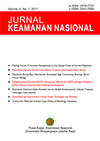Keamanan Nasional dalam Konteks Isu-isu Global Kontemporer: Sebuah Tinjauan Hubungan Internasional
Keywords:
International relations, human security, national securityAbstract
This article discusses global issues and its relation with national security.
Global contemporary issues—drugs, migration, living environment,
population, global economy challenges, liberal democracy crisis, fusion
and division, small arms production—are issues that emerged as new
security threats that transformed since the end of the Cold War. Security
threats are no longer in form of “military attacks” that one country does
to another, but are acts of crime that are performed by non-state actors and
are aimed at state actors, individuals or citizens that ultimately threaten
human security. Human security is a new term in response of threats from
global contemporary issues. This article concludes that national security
in the context of global contemporary issues in an international relations
perspective is a complex issue. This is explained in the transnational theory
in international relations. United Nations have reassessed the concept of
national security which then noted about human security.
Downloads

Downloads
Published
Issue
Section
License
Please read and understand the copyright terms for submissions to this journal.
Copyright Notice
The Jurnal Keamanan Nasional is under the Creative Commons Attribution 4.0 International (CC-BY 4.0) License, according to which:
1) Authors retain copyright and grant the journal the right to first publication, with the work simultaneously licensed under the Creative Commons Attribution (CC-BY 4.0) that allows the sharing of articles published with the acknowledgement of authorship and the initial publication in this journal.
2) The authors are authorized to make additional contracts separately for distribution of the version of the work published in this journal (for example, publication in an institutional repository or as a chapter of the book), as long as there is recognition of authorship and initial publication in this journal.
3) Authors are authorized and encouraged to publish and distribute their work online (for example, in institutional repositories or on their personal pages) at any time before or during the editorial process, as it increases the impact and reference of the published work.












